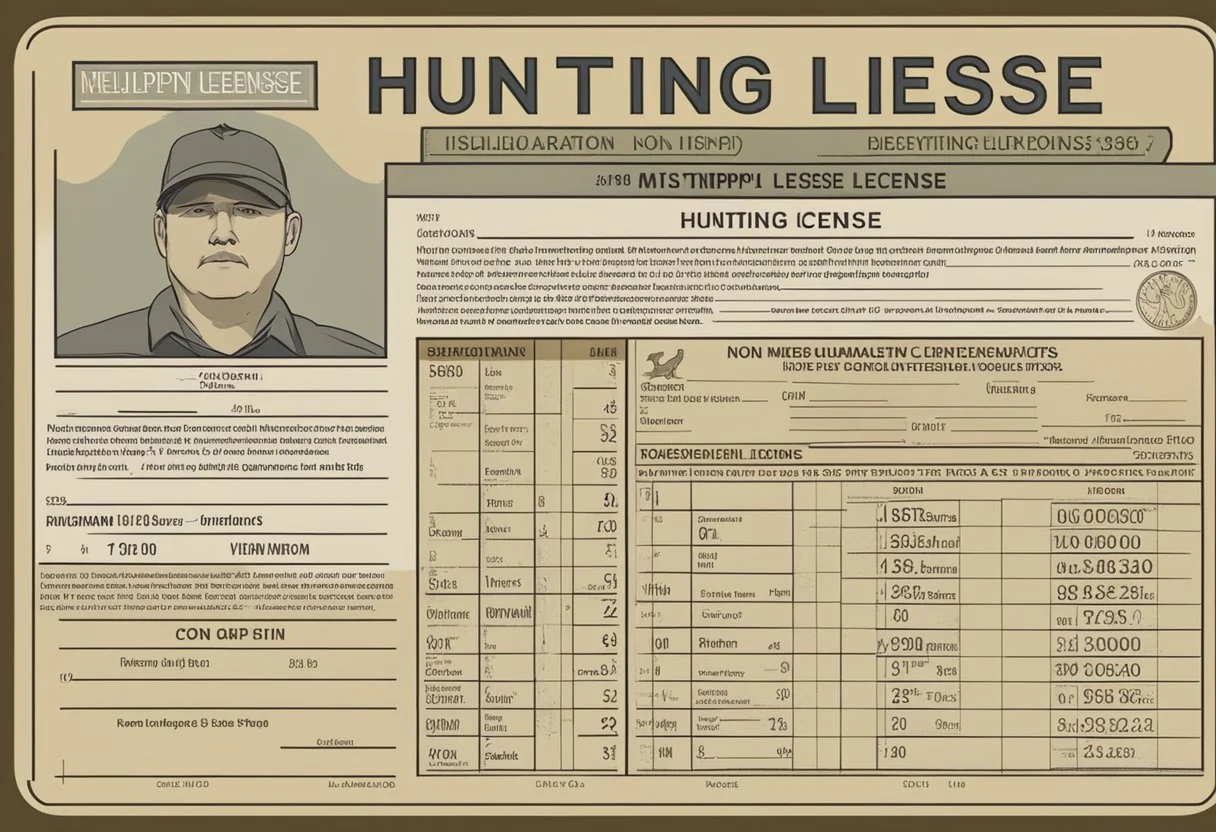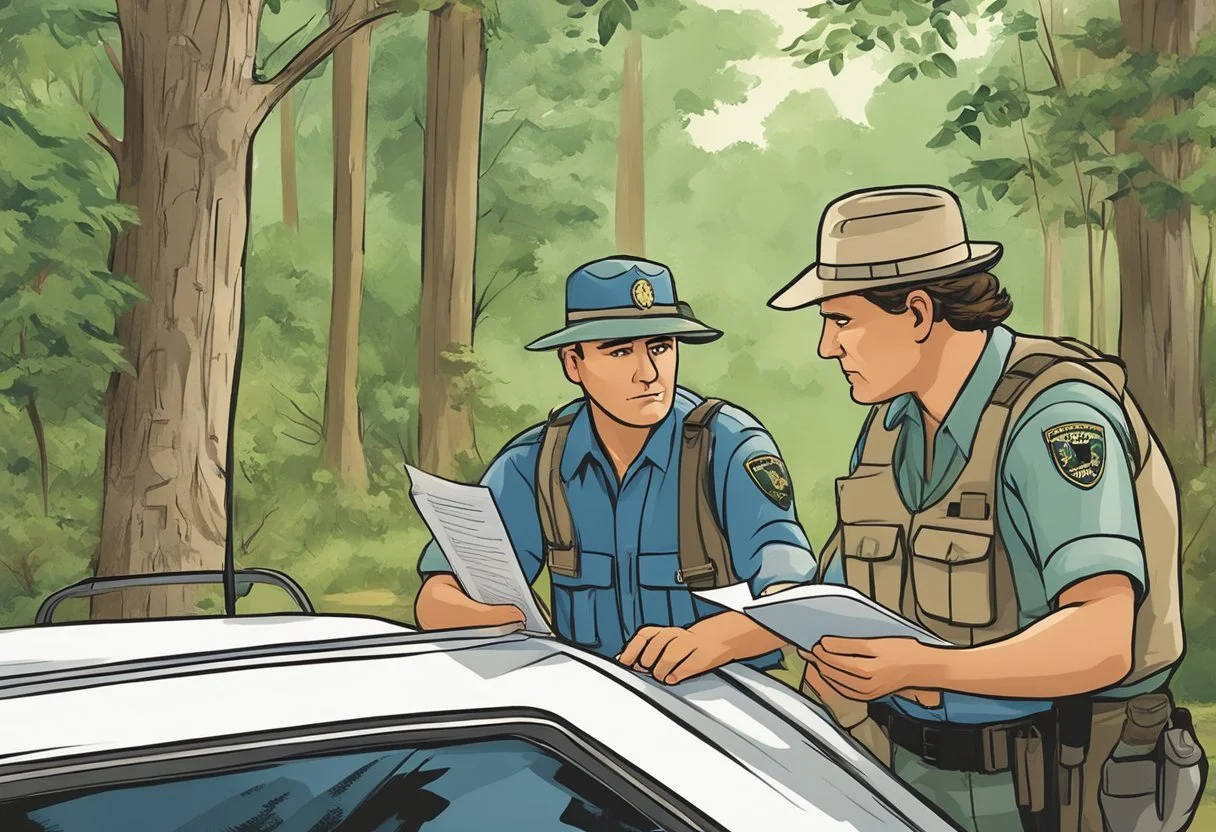How to Get a Mississippi Non Resident Hunting License
Your Essential Guide to Hunting in the Magnolia State
This Article is Part of Our Guide to Non Resident Hunting Licenses by State
Non-resident hunters looking to explore the diverse wildlife habitats of Mississippi must be aware of the state's licensing requirements. To hunt legally in Mississippi, individuals not residing within the state boundaries are mandated to obtain a non-resident hunting license. This stipulation ensures that all hunters comply with state regulations and contribute to the conservation efforts funded by license fees.
Mississippi provides a range of options for non-resident hunters, including different types of licenses based on the game pursued and the duration of the hunt. Annual and short-term licenses are available, and specifics can be found through the Mississippi Department of Wildlife, Fisheries, and Parks (MDWFP). Understanding these options allows non-residents to make informed decisions about which license best suits their hunting needs.
Accessibility to licensing has been streamlined by the MDWFP, and hunters may purchase the necessary documentation online, provided they meet certain criteria. A valid driver's license or, in its absence, a social security number may be required at the time of application. Additionally, Mississippi enforces educational requirements for hunters born on or after January 1, 1972, with the stipulation of a passed hunter education course, assuring all non-resident hunters are knowledgeable about safety and best practices in the field.
Understanding Hunting Licenses
In Mississippi, appropriate licensing is mandated for hunting, with distinct requirements and options for residents and non-residents. These regulations are overseen by the Mississippi Department of Wildlife, Fisheries, and Parks to ensure legal and sustainable hunting practices.
Types of Mississippi Hunting Licenses
Mississippi offers a variety of hunting licenses to cater to different groups, including age-specific options like youth exempt licenses for individuals under 16 and senior exempt licenses for those over 65. The state also provides lifetime licenses for those who wish to make a long-term investment in hunting. Residents must present a valid Mississippi driver's license, while non-residents are required to purchase non-resident hunting licenses.
Hunter Education Requirements
Individuals born on or after January 1, 1972, must complete a hunter education course before obtaining a hunting license. The Mississippi Department of Wildlife, Fisheries, and Parks mandates this course to ensure hunters possess knowledge of safe hunting practices. Proof of completion, the Hunter Education Number, is necessary when purchasing a license.
Non-Resident License Options
Non-residents wishing to hunt in Mississippi must adhere to specific licensing requirements. They can choose from various licenses such as All Game Hunting, differing in duration and species covered. The date of issuance marks the start of validity for any annual non-resident license, and additional permits may be necessary for certain game or hunting methods.
Eligibility and Exemptions
In Mississippi, specific rules determine eligibility for hunting licenses and outline several exemptions for non-residents and residents alike. This section covers those individuals who do not require a license to hunt in the state, and the criteria non-residents must meet to qualify for resident licenses.
License Exemptions
The State of Mississippi allows for certain exemptions where individuals are not required to obtain a standard hunting license:
Minors: Non-residents under the age of sixteen (16) are exempt from requiring a hunting license.
Military Exemption: Active duty military personnel are eligible for exemptions under certain conditions.
Disability Exemptions: This includes paraplegic individuals, multiple-amputees, and quadriplegics who may be eligible for special licensing privileges.
Senior Exemptions: Residents of Mississippi who are 65 years of age or older may be eligible for a senior exempt license.
It is notable that exemptions typically require proof or certification, such as a statement from the Veterans Administration for disabled veterans.
Qualifying for Resident Licenses
For non-residents seeking resident license privileges, the state has specific qualifications that must be met:
Residency Requirements: Non-residents must establish resident status in Mississippi, which generally involves demonstrating permanent domicile, financial independence, and absence of residential ties to other states.
Special Circumstances: In some cases, individuals attending an educational institution in Mississippi or non-resident landowners with substantial acreage may qualify for resident licensing under special circumstances provided by law.
All individuals, residents or non-residents, must comply with the Mississippi Department of Wildlife, Fisheries, and Parks guidelines to legally hunt in the state.
Permits and Stamps
For non-residents hunting in Mississippi, obtaining the appropriate permits and stamps is a crucial step in adhering to state regulations. These documents are mandatory for various game and hunting activities, ensuring legal and regulated hunting.
Waterfowl Stamp and Federal Duck Stamp
Non-resident hunters pursuing waterfowl are required to purchase both the Mississippi Waterfowl Stamp and the Federal Duck Stamp. The Mississippi Waterfowl Stamp allows hunting of waterfowl within the state, while the Federal Duck Stamp is a nationwide requirement for hunters aged 16 and older. These stamps are valid for one year from the date of purchase, and often conservation funds generated from sales contribute to habitat preservation.
Mississippi Waterfowl Stamp: Required for waterfowl hunting
Federal Duck Stamp: Mandatory nationwide for hunters 16+
Special Hunting Permits
In addition to regular hunting licenses, certain game species require special hunting permits in Mississippi. For instance:
Deer Permit: A non-resident must obtain this permit to hunt deer.
Spring Turkey (What wine goes well with turkey?) Permit: Essential for hunting turkey during the spring season.
WMA User Permit: A Wildlife Management Area (WMA) User Permit is necessary for non-residents wishing to hunt in any of Mississippi's WMAs.
The purchase of these permits must coincide with the specific hunting season and adhere to the bag limits and other regulations set by the Mississippi Department of Wildlife, Fisheries, and Parks.
Licenses for Particular Game and Weapons
Mississippi offers a variety of hunting licenses to non-residents, tailored to the type of game and the weapons used. These licenses are structured to both protect wildlife and provide hunters with legal pathways for their sporting activities.
Archery, Primitive Weapon, and Game Hunting
Non-residents interested in game hunting using archery or primitive weapons must obtain the appropriate licenses. Mississippi defines primitive weapons as muzzleloaders and archery equipment. Specific licenses, such as the Archery/Primitive Weapon License, allow hunters to pursue game during designated seasons.
Archery/Primitive Weapon License: Necessary for hunting with bows and primitive firearms.
Trapping and Small Game Hunting
For those who partake in trapping or small game hunting, there are distinct licenses available. The trapping license is a requirement if one intends to trap furbearing animals.
Small Game Hunting License: Required for hunting species classified as small game.
Trapping License: Mandatory for setting traps for fur-bearing animals.
Turkey and Deer Hunting Specifics
Mississippi provides separate licenses for turkey hunting and deer hunting due to the specific regulations and seasons for these species. Hunters must be mindful of the spring turkey season.
Spring Turkey Season License: This is specifically for hunting turkey during the spring season.
Deer Hunting License: A separate license that authorizes the hunting of deer.
Each type of game and method of hunting has corresponding regulations and season dates, which are important to follow for legal and ethical hunting practices. Hunters should always refer to the most recent regulations as provided by the Mississippi Department of Wildlife, Fisheries, and Parks to stay compliant with current laws.
Fishing Licenses and Regulations
In Mississippi, distinct licensing requirements are stipulated for non-resident anglers in both freshwater and saltwater environments. Compliance with these regulations is mandatory to ensure the conservation of the state’s aquatic resources.
Freshwater and Saltwater Fishing Licenses
Non-resident anglers in Mississippi are required to possess the appropriate license for fishing, whether in freshwater or saltwater. Separate licenses are issued for each type of fishing activity to address specific environmental concerns and species protection. For freshwater fishing, various licenses are available, including a general fishing license, a freshwater commercial fishing license, a freshwater guide license, and a freshwater guide boat license. Similarly, for saltwater fishing, distinct licenses ensure the responsible harvest of marine species.
Licenses can typically be purchased on an annual basis, providing licensing from the date of issuance. Certain specialized licenses, such as a slat basket license, may be required for specific fishing methods or for the management of nuisance animals in both freshwater and saltwater bodies.
Contrast with Non-Resident Fishing Licenses
Non-resident licenses differ from resident licenses in terms of eligibility and cost. Individuals who are not residents of Mississippi and are aged sixteen or older must obtain a non-resident license to fish in the state's waters. Minors under the age of sixteen are exempt from this requirement. Non-residents may also face different fees for licenses and permits, which are usually higher than those for residents.
The state of Mississippi enforces these regulations to balance recreational opportunities for out-of-state visitors with the sustainable use of the state’s fishery resources. It is critical for non-residents to keep abreast of these distinctions to ensure they are properly licensed when fishing in Mississippi's diverse aquatic environments.
Enforcement and Penalties
The State of Mississippi has set forth regulations and penalties to ensure that hunting activities are conducted within the legal framework. Non-residents must adhere to specific license requirements, and violations can result in significant fines and repercussions.
Unlawful Purchase and Use of Licenses
Under Mississippi law, it is unlawful for any individual to purchase or use a resident hunting license unless they are domiciled within the state. Violators may face misdemeanor charges, and upon conviction, fines range from $500 to $1,000 for the first offense. Repeat offenders face escalating penalties and may lose their hunting and trapping privileges.
Transporting and Selling Game
Controlling the transportation and sale of game is critical for wildlife conservation in Mississippi. Non-residents must ensure that any game hunted is transported according to state regulations. The sale of animals native to Mississippi by non-residents without the appropriate permissions is strictly prohibited. Failure to comply with these regulations can lead to legal action and potential loss of hunting privileges in the state.
Hunting on Public Lands
Mississippi offers a variety of public lands where non-residents can hunt, primarily under the management of the Mississippi Department of Wildlife, Fisheries, and Parks (MDWFP). These areas provide opportunities to hunt diverse species in accordance with state regulations.
Accessing Wildlife Management Areas
Wildlife Management Areas (WMAs) in Mississippi are accessible to non-resident hunters who possess the appropriate licenses and permits. The MDWFP manages over 50 WMAs across the state, ensuring that these lands are open and maintained for hunting. Hunters are encouraged to:
Check the specific WMA: Each WMA may have distinct rules and access dates which are published by the MDWFP.
Obtain the required WMA User Permit: This is in addition to any hunting license and can be purchased wherever hunting licenses are sold or directly from the MDWFP.
Public Land Hunting Regulations
The MDWFP enforces regulations to ensure hunting on public lands is ethical, sustainable, and safe for all hunters. Key regulations include:
Compliance with Statewide Regulations: All hunters must follow statewide hunting laws in addition to any specific WMA regulations.
Age Requirements: Non-residents under 16 are exempt from the licensing requirement but must adhere to all other regulations.
Non-resident hunters should familiarize themselves with all relevant regulations to ensure a lawful and enjoyable hunting experience on Mississippi's public lands.
Additional Information for Hunters
Before venturing into the Mississippi wilderness, hunters should acquaint themselves with ethical hunting practices and understand their role in conservation efforts. These components are crucial for maintaining a sustainable and respectful hunting culture.
Ethical Hunting Practices
Ethical hunting begins with education. In Mississippi, hunters must complete a hunter education course if they were born on or after January 1, 1972. This course not only teaches safety but also underscores the importance of following legal guidelines and respecting wildlife. Ethical hunters adhere to fair chase principles, strive to achieve quick and humane kills, and make every effort to track and retrieve all game.
Conservation Efforts and the Role of Hunters
The Mississippi Department of Wildlife, Fisheries, and Parks (MDWFP) oversees conservation efforts in the state. Hunters contribute to these efforts by:
Regulating wildlife populations to maintain ecological balance.
Habitat improvement through fees from hunting licenses funding conservation programs.
Respecting seasonal and bag limits to ensure sustainable harvests.
Hunters act as stewards of the land and engage in conservation activities that preserve Mississippi’s diverse habitats for future generations.
Legal Aspects and Hunter Responsibility
In Mississippi, non-resident hunters are subject to specific legal requirements and bear responsibility for understanding and adhering to both state and federal hunting regulations. They must also respect the rights of landowners while engaging in hunting activities.
Understanding State and Federal Regulations
Non-resident hunters are required by the Mississippi Department of Wildlife, Fisheries, and Parks (MDWFP) to obtain a hunting license if they are over the age of sixteen. The definition of a non-resident is an individual who does not meet the criteria to be considered a resident of the state of Mississippi. It is critical for hunters to recognize what constitutes legal game in Mississippi, as stipulated by the Commission on Wildlife, Fisheries, and Parks, to ensure compliance with state game laws.
Legal Game: Refers to species that may be legally hunted as per the given season and regulations.
Hunting License: Mandatory for non-residents over the age of 16.
Commission: The governing body that sets forth hunting regulations in Mississippi.
Classification Requirement Resident Must fulfill state-defined criteria for residency Non-resident Must obtain a hunting license unless under age 16
Responsibilities of the Hunter
Hunters have the responsibility to complete a Hunter Education Course if born on or after January 1, 1972. This course educates hunters on safe practices and ethical behavior. In addition to knowing the laws, non-resident hunters must also ensure their actions do not negatively impact local wildlife populations and ecosystems.
Hunter Education: Essential for safe and responsible hunting.
Ethical Behavior: Obligation to hunt in an ethical manner.
Hunting with Respect to Landowner Rights
Accessing privately owned land requires explicit permission from the landowner. Non-resident hunters must obtain this permission to hunt legally on such properties. They must honor any restrictions imposed by the landowner and leave the property as they found it.
Landowner Permission: Must be obtained before hunting on private land.
Respect to Property: Hunters are expected to maintain the condition of the land.
In conclusion, non-resident hunters in Mississippi must be diligent in their understanding of the legal framework and their personal responsibilities. They must demonstrate respect for the landowner's rights, adhere to the set regulations, and commit to ethical hunting practices.
#MississippiHuntingLicense #NonResidentHunting #OutofStateHunting #HuntingPermits #WildlifeConservation #OutdoorAdventures #HuntingRegulations




